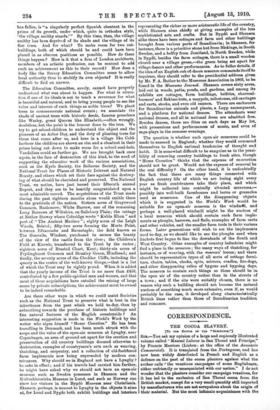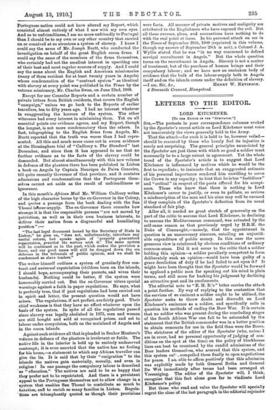CORRESPONDENCE.
THE COCOA SLIVERY.
[To Tim Eprros or ms ErscrAros."]
Sin,—Yon ask my opinion of a large and copiously illustrated volume called "Manual Labour in San Thom6 and Principe," by Francis Minter° (Lisbon at the office of the Anuilario Commercial). It is translated from the Portuguese, and has now been widely distributed in French and English as a defence on the part of the cocoa planters against what the author calls "the vexatious campaigns of some Englishro,en, either unfriendly or unacquainted with our nation." I do not wonder that the planters consider our campaign vexatious, for it has led to the exclusion of San Thome cocoa from the British market, except for a very small quantity still imported by manufacturers who are not scrupulous about the origin- of their material. But the most intimate acquaintance with the Portuguese nation could not have altered my Report, which consisted almost entirely of what I saw with my own eyes. And as to unfriendliness, I am no more unfriendly to Portugal than I should be to my own or any other country that carried on or connived at so atrocious a system of slavery. I know I could say the same of Mr. Joseph Burtt, who conducted the investigation on behalf of the great English cocoa firms. I
could say the same of the members of the firms themselves, who certainly had not the smallest interest in upsetting one of their beet and most regular sources of supply. And I could say the same about the English and American missionaries (many of them resident for at least twenty years in Angola) whose condemnation of the "contract system" as identical with slavery at every point was published in the Times by the veteran missionary, Mr. Charles Swan, on June 22nd, 1909.
Except for our Consular Reports and a certain number of private letters from British residents, that covers the English "campaign," unless we go back to the Reports of earlier
travellers, ten to fifty years ago. I had no interest whatever in exaggerating the horrors of the system. The other witnesses had every interest in minimising them. Yet on all essential points our evidence agrees, and my Report, though the longest, is not more condemnatory than the others. In fact, telegraphing to the English firms from Angola, Mr. Burtt reported that the truth was worse than I had repre-
sented. All this and much more came out in sworn evidence at the Birmingham trial of "Cadbury v. The Standard" last December, and since then it has appeared to me that no further evidence as to the facts of the slavery could be demanded. But almost simultaneously with this new volume in defence of the planters there has been published in Lisbon
a book on Angola by Captain Ffenrique de Pairs Conceiro, till quite recently Governor of that province, and it contains
admissions and condemnations that the Portuguese them- selves cannot set aside as the result of unfriendliness or ignorance.
• In this month's African Mail Mr. William Cadbury writes of the high character borne by the en-Governor in the Colony, and quotes a passage from the book dealing with the San Thome Latour-supply. The en-Governor there remarks how strange it is that the responsible persons "are not moved by patriotism, as well as in their own business interests, to
deliver their nation from a disgraceful and humiliating position" "The last legal document issued by the Secretary of State in Lisbon," he goes on, "does not, unfortunately, introduce any useful reform, but speaks again of properly guaranteed repatriation provided the natives wish it.' The same system will be continued as in the past, which makes the provision a farce, and our good name will still be dragged down the via doLorosa in the tribunals of publics opinion, and we shall be condemned as slave traders."
The writer himself outlines a system of genuinely free con- tract and universal repatriation (children born on the islands, -I should hope, accompanying their parents, and wives their husbands). Nothing could be better, if the system were
honourably carried out. But the ex-Governor utters special warnings against a faith in paper regulations. He says, what is perfectly true, that if past regulations had been carried out in spirit and letter, the present question would not have arisen. The regulations, if not perfect, are fairly good. Their chief weakness is that they have no effect whatever upon the • basis of the system. In spite of all the regulations passed since slavery was legally abolished in 1875, men and women are still bought and sold at recognised prices, and set to labour under compulsion, both on the mainland of Angola and in the cocoa islands.
• Against such evidence all that is pleaded in Senhor Mantero's volume in defence of the planters is irrelevant or futile. The native life in the interior is held up to entirely undeserved contempt; it is even asserted that the native has no feeling for his home,—a statement to which any African traveller can • give the lie. It is said that by their " emigration " to the islands the natives gain materially, morally, and even in religion ! In one panne the compulsory labour is described *as "education."- The natives are said to be so happy that , they prefer not to be repatriated. And there is a persistent • appeal to the Portuguese themselves not to allow change in a_ • system that enables San Thome to contribute so much to taxation, and to enrich so many families in Lisbon. Regula- • tiona are triumphantly quoted as though their provisions-
were facts. All manner of private motives and malignity are attributed to the Englishmen who have exposed the evil. But all these excuses, pleas, and accusations have nothing to do with the real point at issue. In his personal attack on me in the Times of September 28th, 1909 (reprinted in this volume, though my answer of September 29th is not), a Colonel J. A. Wyllie stated that he was "in no way concerned to defend servical recruitment in Angola." But the whole question turns on the recruitment in Angola. Slavery is not a matter of treatment, but of the purchase of human beings and their compulsory labour ; and we have now an unshaken body of evidence that the bulk of the labour-supply both in Angola itself and on the islands comes under the definition of slavery.
—I am, Sir, &c., HENRY W. NEITINSON. 4 Downside Crescent, Hampstead.







































 Previous page
Previous page